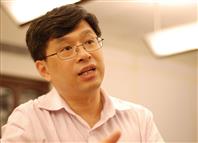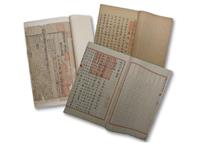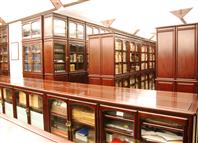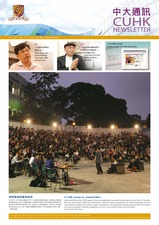‘I can endure cold and hunger, but I can’t lose any of my books, even for a single day.’ This motto is inscribed by Wu Xian in the Qing Dynasty for his private library. This attitude is common among book admirers and collectors, or bibliophiles, over the centuries. In China, literati in ancient and modern times have passion for antiquarian books, and are keenly interested in collecting them. Their untiring efforts have resulted in the building of many private libraries, which were ruined and abandoned due to societal changes. When a visitor enters the Rare Book Room at the University Library of CUHK and flip through a book, not only the book’s contents but also its handling history are worth reading. Although the collection is tiny compared to those at national libraries, the colourful world it portrays is nothing short of fascinating.
‘There’s so much fun here. When I open a book, the seals and inscriptions have stories to tell. Many books are interconnected, they might have once belonged to the same owner, but were separated due to war and subsequently acquired by different collectors, and later put together again. Antiquarian books carry the traces of history, through which we can get an idea of how people had lived,’ said Mr. Lam Chun-kwong, sub-librarian, head of Special Collections Department, University Library System.
Remarkable Stories Beyond Paper and Ink
What are the greatest treasures now sitting atop the hill in Ma Liu Shui, inside the Rare Book Room? ‘Woodblock prints of Yuan Dynasty, hand-written copies from the Ming Dynasty, authentic transcriptions of Complete Library of Four Branches of Books, and manuscripts of Qing poet Wang Shizhen, are the cream of the crop,’ said Lam Chun-kwong. The life of a book is similar to mankind; both have their ups and downs, and must experience all kinds of life’s intricacies.
Most of the books in the Rare Book Room are Chinese stitch-bound books. The most ancient are two woodblock print titles dating back to the Yuan Dynasty. The Annotations to the Book of Changes is over 700 years old, and once belonged to one of the four major private libraries, Tower of the Eight Thousand Fascicles built by the Ding brothers in the late Qing Dynasty. The first page of the book had a rectangular seal indicating its ownership. Later when Ding’s collection was scattered, this book was supposed to be moved to Jiangnan Library in Nanjing, but it was mysteriously removed. The seal’s bottom right hand corner was cut and the book was resold. Now it is in Hong Kong.
Literary Works of Mr. Zongyuan, a hand-written copy from the Ming Dynasty also had a rugged fate. Originally kept in Qunbi Tower owned by modern bibliophile Deng Bangshu, the collection was scattered when Japan invaded China, and quite a number of books were rescued by the famous scholar and book admirer Cheng Chen-tou. The ancient books Cheng acquired were kept in Taiwan’s Central Library, and this book was one of them. However it was lost during transfers and came into the collection of Bei Shan Tang which later donated it to CUHK.
The beautifully transcribed Book Shadow is an authentic and invaluable title of the imperial library, i.e., Wenlange’s edition of Complete Library of Four Branches of Books. Since another book by the same author, Zhou Lianggong, was accused of spreading anti-Qing sentiments, all his works must be withdrawn, banned and burned. This book is extremely fortunate to have escaped burning and survived to this day.
Mission in Preserving Cultural Heritage
The Rare Book Room aims to provide an ideal place to store antiquarian books, and if possible acquire new collections. In the meantime, since it lacks funding and repairing skills, if a donated book is inherently damaged, there is no way to mend it. Mr. Lam said the University Library is now collecting books published from 1911 to 1949, i.e., the early days of the Republic of China. But preservation of such books is very difficult because they were printed on acidic paper which makes the book brittle. Works published from 1949 to 1977, i.e., from the establishment of the People’s Republic of China (PRC) to the end of the Cultural Revolution, are now regarded as ‘new rare titles’ because numerous books and archives were eradicated following waves of political movements. Apart from that, books related to China studies and Sino-western relations, especially those printed in foreign languages, are given priority. Although 500 titles of rare books have been converted to digital files, full-scale digitization is still pending.
Never Ending Passion for Ancient Books
‘The happiest moment is to receive books. If there’s a piece published before the 60th year of Qianlong, I’d feel great. If I found a book that had been soiled or worm-eaten, I’d feel upset. Recently, we’ve received a volume of Yongle Canon which was a reprint to commemorate the 10th anniversary of the PRC government, but sadly the borders were destroyed by worms,’ Mr. Lam recalled with regret. ‘Deng Bangshu of Qunbi Tower is fascinating. Whatever he wanted to acquire, he just bought it even if it cost him a fortune or incur a huge debt. Now, when I hold one of his books in my palms, reading his remarks, I’d feel excited. It seems that Deng is right in front of me. Rare books of this kind are full of feelings. They have a life of their own.
Book admirers of all periods in time and from different countries have one thing in common—they don’t see books as mere books, but human beings. A book is a reflection of the past, and links us to our roots. When we vow to preserve our historical and cultural heritage, we are actually preserving the fountains of life. 




































































































































































Social Bookmarks